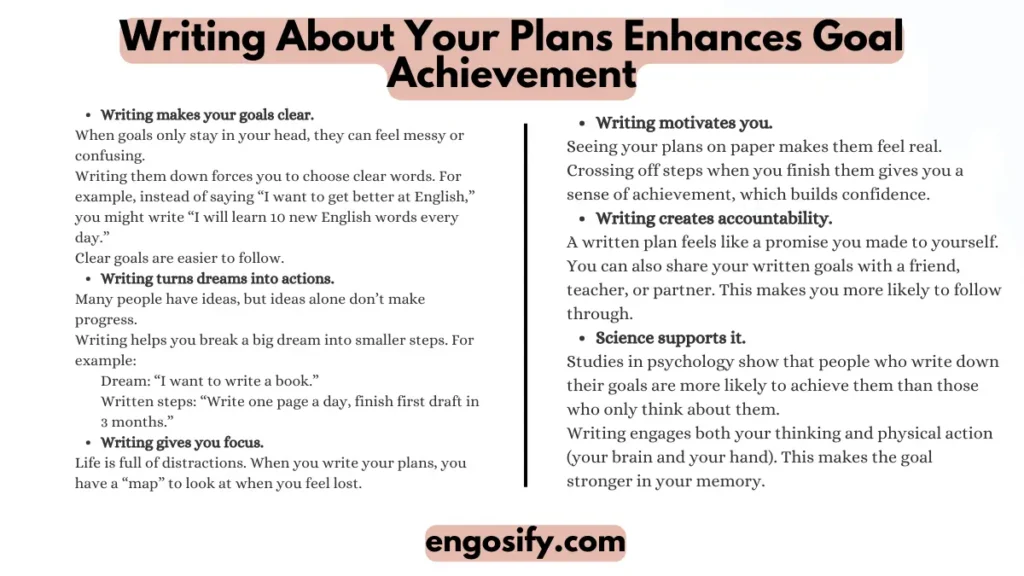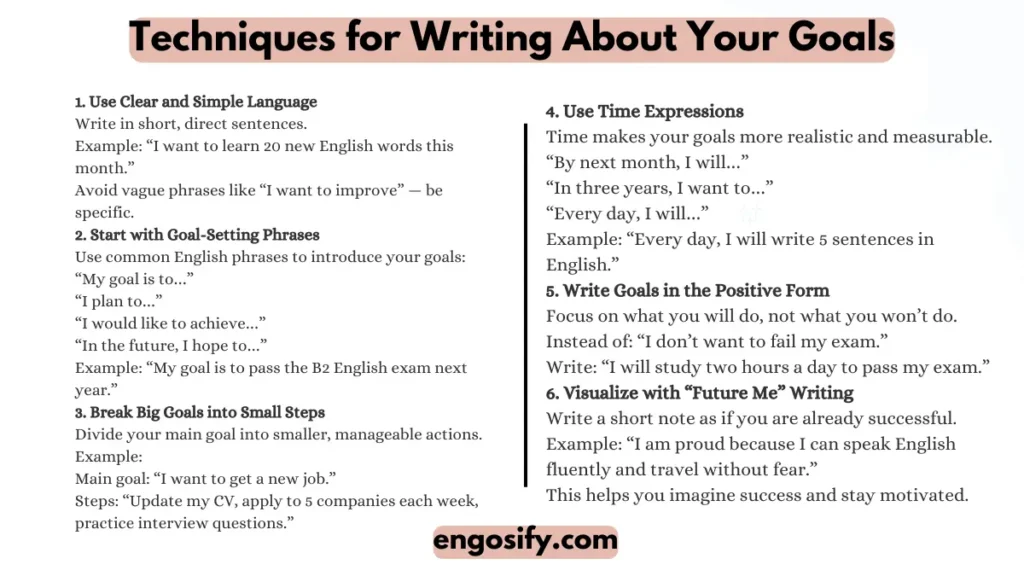Introduction
Setting goals and writing about your plans in English might sound simple, but it’s actually a skill that can change the way you think, act, and achieve. Imagine having your dreams, career ambitions, or personal milestones clearly written down — suddenly, they feel real, tangible, and reachable. In this article, we’ll explore how to express your goals effectively, overcome common challenges, and use practical techniques that boost your confidence and writing skills. Whether you’re a student, professional, or lifelong learner, this guide will show you how to turn your aspirations into clear, actionable plans in English.
Introduction to Expressing Your Goals
What Does It Mean to Express Your Goals in English?
Expressing your goals in English isn’t just about putting words on paper — it’s about communicating your intentions clearly and confidently. When you write your plans in English, you’re practicing critical thinking, organizing your thoughts, and showing commitment. For non-native speakers, it also improves vocabulary, grammar, and sentence structure while helping you articulate ideas that might otherwise stay vague in your mind.
Think about it: writing down a goal like “I want to improve my English speaking skills by the end of the year” already sets the stage for action. It’s not just a wish; it’s a plan. This practice isn’t limited to personal growth — it works wonders for career development, academic achievements, and even daily life planning.
By writing your goals, you’re also creating a reference point. You can revisit it, track your progress, and adjust your actions as needed. Many studies show that people who write down their objectives are more likely to achieve them. That’s why learning to express your goals in English is more than just an exercise — it’s a stepping stone toward real success.
Why Writing About Your Plans Enhances Goal Achievement
Writing your plans helps you clarify priorities, break down overwhelming dreams into manageable steps, and build motivation. When you see your goals in writing, your brain starts treating them as concrete tasks rather than distant wishes. Plus, written goals serve as a roadmap, making it easier to measure progress and celebrate milestones.
To get started, you can learn how to structure your goals effectively by exploring useful techniques for setting SMART goals. This method helps make every goal Specific, Measurable, Achievable, Relevant, and Time-bound. Even better, writing exercises allow you to practice new vocabulary and expressions that naturally improve your English fluency.
With a little guidance and consistent effort, expressing your goals in English becomes not only easier but also incredibly empowering. In the next part, we’ll dive deeper into understanding goal expression, uncovering common challenges, and exploring ways to overcome them.

Understanding Goal Expression
The Power of Written Goals
Have you ever noticed how a dream feels more real when you write it down? That’s the magic of written goals. When you put your plans into words, your brain treats them as tangible objectives instead of vague ideas floating around in your mind. Writing goals in English, especially if it’s not your first language, does double duty: it strengthens your language skills while making your ambitions clear and actionable.
Research shows that people who write down their objectives are significantly more likely to achieve them than those who don’t. Why? Because the act of writing forces you to organize your thoughts, define priorities, and visualize the steps needed to succeed. For example, instead of vaguely thinking “I want to get better at English”, writing “I will improve my English vocabulary by learning 20 new words each week for three months” immediately adds clarity and accountability.
Common Challenges in Expressing Goals in English
Even though goal writing is powerful, it’s not always easy. Many learners face hurdles such as:
- Language barriers – Finding the right words to express your plans can be tricky.
- Limited vocabulary – You might know what you want to say, but not how to phrase it accurately.
- Fear of mistakes – Worrying about grammar or spelling errors can hold you back.
- Overthinking – Some people struggle to narrow down broad ambitions into specific, actionable steps.
These challenges can make goal writing feel intimidating, but don’t worry — they’re completely normal. Even native speakers sometimes struggle to articulate long-term plans clearly.
Overcoming These Challenges
Here’s the good news: overcoming these hurdles is possible with a few strategies.
- Use simple language – Clarity beats complexity. Focus on expressing your ideas rather than perfect grammar.
- Learn goal-related vocabulary – Words like achieve, plan, develop, improve, succeed, and accomplish are handy tools for clear expression.
- Practice regularly – Like any skill, writing gets easier with repetition. Start with small, daily goals and gradually tackle bigger ones.
- Reference proven frameworks – Techniques like SMART goals provide structure, making your writing organized and focused.
By understanding the power of writing goals and addressing common obstacles, you’re already halfway to becoming confident in expressing your plans in English.
Techniques for Writing About Your Goals
Using the SMART Framework
One of the most effective ways to express your goals in English is by applying the SMART framework. This approach ensures your goals are Specific, Measurable, Achievable, Relevant, and Time-bound. Let’s break it down:
- Specific: Your goal should be clear and precise. For example, instead of saying “I want to learn English”, write “I want to learn 100 new English words in the next month.”
- Measurable: Track your progress. Using numbers or milestones helps you stay on target.
- Achievable: Set realistic goals. Overly ambitious objectives can lead to frustration.
- Relevant: Your goals should align with your bigger ambitions, like career advancement or personal growth.
- Time-bound: Give yourself a deadline. This adds urgency and encourages consistency.

By structuring your goals using this framework, you make your plans actionable, easier to follow, and more motivating. You can even combine this with writing exercises for daily goal tracking to reinforce learning.
Incorporating Action Verbs and Clear Language
When expressing your goals, words matter. Using strong action verbs makes your goals more dynamic and inspiring. Words like achieve, complete, improve, develop, create, master, and organize instantly make your sentences more active.
For example, instead of writing “My goal is to get better at English”, you can say “I will improve my English listening skills by practicing 30 minutes daily.” Notice how the second sentence not only sounds stronger but also communicates exactly what you’ll do.
Another tip: keep sentences short and direct. Overcomplicating your writing can make your goals harder to follow. Use transitional phrases like “in order to,” “as a result,” or “by doing this” to connect ideas smoothly, enhancing clarity and readability.
Structuring Your Writing Effectively
A well-organized goal statement is easier to understand and follow. Consider a simple structure:
- Introduction: Briefly explain your overall goal.
- Details: Describe specific actions, timelines, and milestones.
- Conclusion: Summarize your plan and highlight the expected outcome.
You can also use bullet points or numbered lists for multiple goals or steps. This makes your writing visually clear and encourages accountability.
For example:
- Improve vocabulary by learning 20 new words weekly
- Practice speaking with a partner twice a week
- Listen to English podcasts for 30 minutes daily
This format is straightforward, readable, and encourages regular tracking of your progress. Plus, it naturally integrates LSI keywords like career planning, personal development goals, and academic goal writing without overstuffing.
Practical Examples and Exercises
Sample Goal Statements
Sometimes, seeing examples helps more than reading instructions. Here are a few sample goal statements in English for different areas:
Academic Goals:
- “I will improve my English writing skills by completing one essay per week for three months.”
- “I aim to achieve a B2 level in English by practicing grammar exercises daily.”
Career Objectives:
- “I will enhance my professional communication skills by attending two online English workshops each month.”
- “I plan to write a professional report in English once a week to strengthen my business vocabulary.”
Personal Development Targets:
- “I will expand my English vocabulary by learning 10 new words daily using flashcards.”
- “I aim to watch one English movie per week to improve listening and comprehension skills.”
These examples are specific, measurable, and actionable. Notice how each one uses clear language, action verbs, and a timeline. This makes the goals not only expressed effectively in English but also easy to track and achieve.
Writing Exercises
Practice is key to mastering goal expression. Here are a few writing exercises you can try:
- Daily Goal Journal: Every morning, write one small goal for the day. For example, “Today, I will learn five new English words and use them in sentences.” This keeps you consistent and reinforces vocabulary.
- Weekly Reflection: At the end of each week, write a short paragraph reviewing your progress. Include what worked, what didn’t, and what you’ll do differently next week. This develops self-awareness and accountability.
- Peer Review: Share your written goals with a friend or classmate. Ask them to suggest improvements or give feedback on clarity. This encourages collaboration and exposes you to new expressions in English.
- Action Plan Breakdown: Take a larger goal, like “Improve my English writing skills”, and break it into smaller steps:
- Learn 10 new words per week
- Write one paragraph daily
- Review and edit weekly
- Incorporate Resources: Use online resources like Time’s guide on the power of writing down your goals to get inspiration and tips. This helps you see real-life examples of effective goal writing.
By doing these exercises regularly, you not only improve your English writing skills but also develop a habit of clear, structured, and actionable goal setting. The more you practice, the more confident you’ll become in expressing your ambitions in English.
FAQs
5.1 How Can I Improve My Goal Writing Skills?
Improving your goal writing skills is all about practice and strategy. Start small — write one goal per day, then gradually expand. Use action verbs like achieve, complete, improve, and develop to make your statements dynamic. Also, reading goal examples in English can expose you to natural expressions. Incorporating frameworks like SMART goals adds structure, making your writing organized and easier to follow.
5.2 What If English Is Not My First Language?
Don’t worry — expressing goals in English can be challenging for non-native speakers, but it’s manageable. Focus on using simple, clear sentences rather than complex grammar. Keep a vocabulary list of goal-related words and phrases. For example, terms like plan, target, objective, timeline, and milestone are helpful. Regular practice, reading examples, and even phrases for plans and goals can boost confidence and fluency.
5.3 How Often Should I Review and Update My Goals?
Reviewing and updating your goals is essential for progress. Aim to check your goals weekly or monthly, depending on their complexity. Reflection helps identify what’s working and what needs adjustment. For example, if a weekly target is too ambitious, modify it to make it achievable. The process keeps your goals realistic, actionable, and motivating.
5.4 Can Writing Goals Really Increase Success?
Absolutely! Writing goals transforms abstract thoughts into concrete plans. Your brain treats written goals as commitments, making you more accountable. Studies show that people who write down objectives are significantly more likely to accomplish them. Plus, documenting your goals in English improves language skills while enhancing clarity and focus.
Conclusion
Expressing your goals in English is a powerful way to turn dreams into actionable plans. Writing your objectives clearly gives you direction, motivation, and a roadmap for success. Using frameworks like SMART goals, incorporating action verbs, and practicing regularly helps you articulate your ambitions with confidence and precision.
Breaking down larger goals into smaller, manageable steps allows you to track progress, stay accountable, and celebrate milestones. Regularly reviewing and updating your plans ensures they remain relevant and achievable.
The key takeaway is simple: start writing. Even a few sentences today can set the foundation for significant personal and professional growth. By practicing goal expression in English, you not only enhance your language skills but also cultivate a habit that transforms ideas into real achievements. So take the first step, put your goals on paper, and let your aspirations guide you toward success.

